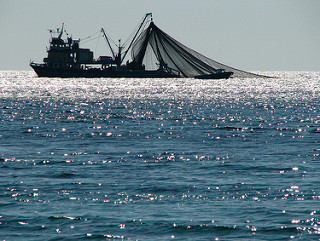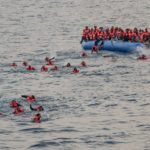
Fish is one of the most popular foods worldwide. Yet, the high demand and unsustainable fishing methods come at a price that might prove fatal for coastal fisher communities and indigenous peoples, as well as for the maritime ecosystem.
Within the Time Wave
Let me take you on a journey 30 years into the future. It is the year 2048 and the last fish has been pulled out of the sea. It is flapping on the deck of a huge fish trawler between algae and jellyfish the number of which has drastically increased over the last three decades. It is the result of an insatiable demand for fish and increasingly effective fishing vessels that have emptied the oceans. And true, for a while the fishing industry had been profitable but once fishing had reached a point where more fish were caught than the populations could naturally reproduce, its days were counted-and with it those of the balance of the oceans, the maritime ecosystem as we knew it.
Back to 2018. The EU is the world’s biggest importer of fish and most of it comes from developing countries. There, overfishing does not only threaten the balance of the oceans but also the social and economic situations of coastal communities that are based on and around fishing.

Culture on the Hook
During the mid-1900s a number of governments sought to increase the availability of protein-rich foods through an increased fishing capacity. The fishing industry was subsidised and favourable policies were agreed upon. Eventually, the fishing industry became so big and powerful that it began to replace local fishers. Through the competition of the fishing industry, and the rising number of fish being caught, the catch of local fishers was – and is – getting smaller and smaller leading to them being unable to sustain themselves which in turn not only leads to cultures and traditions disappearing, but also to problems, such as piracy, that are relevant for the Western world that at the moment still profits from a mass consumption of fish.
The life and traditions of many indigenous coastal communities are centred around fish and fishing. Fish is not only vital for them to sustain themselves, but also for their culture. The Swinomish Indian Tribal Community’s culture, for instance, is closely connected to the salmon and its migration. If the fish that these communities build their traditions around disappear, their cultures will disappear, also. And while many of these people only have small boats to use for fishing, the fishing industry uses highly developed equipment and large ships that move closer to shore lines and into native fishing areas as the number of fish in the ocean decreases, threatening traditions and the environment alike.
Always Look on the Bright Side
If we continue fishing the way we do right now, the oceans will probably be empty by 2048. But there are still enough fish in the seas, so that most species’ populations could be restored, scientists argue, and international actors such as the UN are trying to change things for the better by offering guidelines for sanctions against illegal fishing. On a European scale, the EU parliament has worked out a number of measures in order to battle overfishing in the North Sea. The common fisheries policies (CFP) is supposed to ensure fair competition among fishers and make fishing more sustainable, for example through catch limits between 2015 and 2020. But while it is a swimming stroke into the right direction, success is not guaranteed. And in addition, Great Britain is considering pulling out of the agreement as part of Brexit, making it one country less that takes the threat through overfishing seriously.
Responsibilities, however, do not only rest on the shoulders of political institutions. Companies, as well, have to be accountable for the consequences of their businesses. And some of them have already stepped up to the task. The Seafood Business for Ocean Stewardship (SeaBOS) is an initiative of nine Asian, European and US American companies to reform fishing practices. The surface of our overfished oceans might be churning, underneath, though, hope waits in the deep sea.
But while New Zealand, Australia and the US have shown that fishing reforms are possible and impactful much remains to be done. There are still many loopholes through which sanctions can be avoided and a lack of regulations put on commercial fishing. To prevent fish and indigenous traditions from dying out political institutions, the fishing industry and we, the consumers, need to sit in one boat. Effective laws must be past, restrictions put into place, and we need to see a change in the consumers’ attitude.
By Merle Emrich
Photo Credits
Trawler by Jon Anderson, CC BY-NC-ND 2.0
Fish by Jeremy Keith, CC BY 2.0










